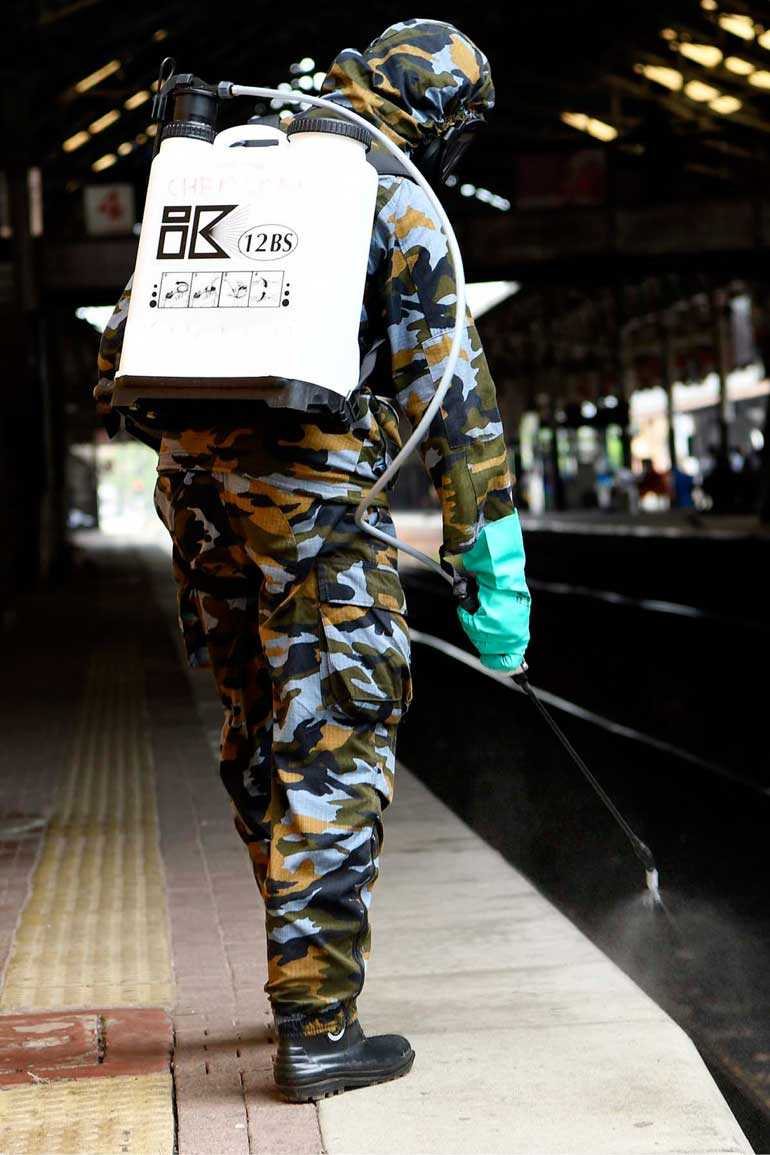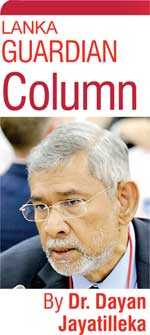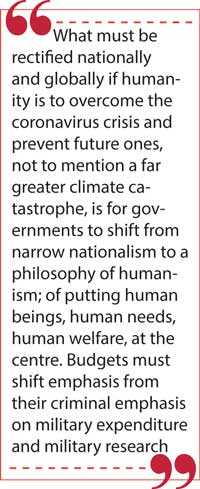Monday Feb 16, 2026
Monday Feb 16, 2026
Friday, 27 March 2020 00:30 - - {{hitsCtrl.values.hits}}

The coronavirus crisis is a giant eraser and tester combined into one. It is erasing all equations and testing all structures. Governments, systems, economies, ways of life and mentalities that acquit  themselves relatively well in combating the crisis and saving lives, will pass this ultimate test, while the ones that do not will begin to fail, however parabolically.
themselves relatively well in combating the crisis and saving lives, will pass this ultimate test, while the ones that do not will begin to fail, however parabolically.
What must be rectified nationally and globally if humanity is to overcome the coronavirus crisis and prevent future ones, not to mention a far greater climate catastrophe, is for governments to shift from narrow nationalism to a philosophy of humanism; of putting human beings, human needs, human welfare, at the centre. Budgets must shift emphasis from their criminal emphasis on military expenditure and military research to human and social needs.
This is how Cuba, a developing country under a tight economic blockade, has excellent education – including higher education—and public healthcare systems as well as an advanced research capacity which has produced the famous drug Interferon Alpha 2B, now being used in China in its successful counteroffensive against COVID-19. Cuba has been humanitarian enough not to turn away ships with patients on board and also to continue its decades-old practice of sending doctors to other lands to help fight the COVID-19 pandemic – a generosity which Sri Lanka has benefited from during the tsunami.
I must echo senior columnist Sarath de Alwis who has said in these pages that he vastly prefers this present governmental dispensation to the previous one at this time of crisis. He goes on to superbly deploy the blackest humour to satirise and caricature the probable ‘Yahapalanaya’ response if that administration had been in office now.
Certainly, each country, including Sri Lanka has to respond nationally, mobilising all its strengths, which in Sri Lanka certainly includes the Defence Ministry, the Armed Forces, STF and Police. A fully integrated, system wide interagency and “whole of society” (as the WHO calls it) approach is imperative.
GMOA Spokesperson Dr. Harith Aluthge cautioned that the growth rate of the spread of COVID-19 in the first week was faster than during the corresponding phase in Italy, which lead to some frightening extrapolations for the month of April in Sri Lanka.
The anti-social behaviour of those who have returned from heavily new coronavirus hit areas and are absconding, mingling among unsuspecting folks in other areas are engaging unwittingly in germ warfare against an innocent civilian population. If ever an Emergency should be declared and the armed forces, a disciplined and respected institution, should be deployed on the streets to inspire and manage a chaotic public engaged in collective self-harm and national jeopardy, then surely this is it.
COVID-19 vs. 19A
That said, there is something that worries me greatly. It is the likening of the coronavirus crisis to the challenges of the last war and a comparative reading which leads to the conclusion that “this is a small matter” (“meka sulu deyak”) by comparison and “your country is safe” (“obey rata surakshithai”).
Lives lost in an attack by a human enemy is one thing, while the threat posed by a deadly virus is a whole other ball game. The closest one can come to is biological warfare, and a biological or chemical attack disseminates faster and invisibly than conventional warfare against a human adversary. While every country must recall its great victories in order to rally the collective spirit of a society, it is also crucial to be mindful of the truth in the old saying “if you are a hammer, every problem looks like a nail”.
every country must recall its great victories in order to rally the collective spirit of a society, it is also crucial to be mindful of the truth in the old saying “if you are a hammer, every problem looks like a nail”.
It was seriously worrying that we were about to be heavily jeopardised by an Establishment attitude in which citizens were to be treated as collateral damage and subjected to a general election while a pandemic was on the rampage. The Presidential announcement was made during a SAARC leaders’ video summit initiated by India’s Prime Minister Modi on the COVID-19 crisis, that Parliamentary Elections would go ahead in Sri Lanka.
Thanks to the Elections Commission and its Commissioner with his independence of mind, social profile and legitimacy, we have stopped short of the brink for the moment, while the danger of the coronavirus tsunami closes in upon us and the selfish afflicted roam among us despite regular warnings. The Elections Commissioner’s life-saving decision is the best possible advertisement for the upside of the 19th Amendment. If not for the 19th Amendment, would the Commission have been bold enough or able enough to make this judgment call? If the answer is ‘no’, then the call to abolish the 19th Amendment shows itself to be a very dangerous idea.
It was the President’s decision not to postpone the election or rather, not to make the judgment call and announce the decision himself, and leave a window for the Commissioner of Elections to do so. His much-awaited address to the nation, with its pitch for a two-thirds majority for the team led by Prime Minister Mahinda Rajapaksa, placed on the record yet again his preference and expectation that the election would be held (and would yield a specific result).
While we have no way of knowing how many people would have been affected had the election been held, what we did know for certain is that it would not help prevention and could not but dangerously accelerate proliferation. In other words, an election would have vastly increased the chances of multiplying the suffering of people and the anguish of their friends and families, and placed a tremendous burden on the overstretched health systems.
This being a small island, the whole population could (and still can) be overrun by the virus and the island infected along all points of the compass. An election campaign and voting day itself entailed the logic of gatherings, commuting, collectivity, socialised activity and proximity that contains double jeopardy: it is not only against the very logic of social distancing that is the main preventive, it works in precisely the opposite direction, as a vast facilitator in the rapid and widespread proliferation of the disease.
Throwing citizens under the bus
Why take such a risk? What kind of discussion within the Government concluded with a willingness to risk a whole population to a deadly biological hazard and vastly enhance the suffering and deaths of millions of citizens, when that risk could be avoided or postponed?
Going by the political column of a leading Sunday newspaper, there seems to be a limit beyond which the Elections Commission cannot go in postponing the holding of an election once nominations have been handed in. However it would probably have been possible to postpone the dangerous election until August this year when the parliamentary term was scheduled to expire, if only the President rescinded his earlier declaration of dissolution and Parliament were reconvened to endorse it with a multiparty consensus on the holding of elections at the latest possible date, which would have provided more time to stabilise the coronavirus crisis. This was the road not taken. But why?
The mystery is why a leadership would forfeit the public relief, gratitude and approval for personally postponing such a risky endeavour until the crisis is over. That would have been the statesmanlike stance to have been taken in the televised address to the nation. What could be more important than the protection of the people and being seen and known by the nation to accord it first priority?
The President had no obstructionist Cabinet to deal with, while the Opposition had always been ready to vote for the allocation of funds except for the provision to raise the ceiling on borrowings i.e. debt.
The reason that was given up until the dissolution, and by some key influencers, even after, was not that of blocked finances but that it was necessary to strengthen the President’s hand by obtaining a two-thirds majority at the election to abolish the 19th amendment.
The perceived existential urgency of this political objective was about to put the entire country in deadly danger. Though opportunistically echoed by some in the SLPP and SLFP, the public record shows where the drive comes from: The Alt-Right or New Right including the religious Right. It is the Alt-Right comprising the Yuthukama-Viyath Maga-Eliya bloc that urgently seeks the constitutional changes which require a two-thirds majority, for two reasons.
Firstly, it conforms to their long-held ideological positions. Secondly, and perhaps more pertinently, it is because they hope that centralisation of power in the hands of the President, shifting it from the PM and the Legislature would enable the Alt-Right to be strategically seeded throughout the state and thereby to be able to wield greater power than the democratic politicians, and steer the nation in their preferred extremist and polarising direction.
A key ideologue of the Alt-Right, wired into all power centres of the ruling bloc, made the case amply clear well after the coronavirus crisis erupted, at an event reported on 19 March: ‘Yuthukama Convener Gevindu Cumaratunga says a two-thirds majority at the next Parliamentary Election was nothing but a prerequisite to introduce far reaching constitutional changes proposed by President Gotabaya Rajapaksa and the Sri Lanka Podujana Peramuna (SLPP). Asked whether President Gotabaya Rajapaksa required a two-thirds majority to govern the country, Cumaratunga said such an overwhelming majority wasn’t needed. A simple majority would suffice, Cumaratunga said, pointing out proposed constitutional changes couldn’t be brought in without a two-thirds majority. Cumaratunga said: “The Constitution enacted in 1978 is full of provisions inimical to Sri Lanka. The 13th Amendment introduced to the Constitution in late 1987 forced on us at India’s behest, too, contained many adverse clauses. One such clause prevented the use of Sinhala Language in the Northern and Eastern regions as State Language. The 19th Amendment denied the President the power to dissolve the House in case the parliament took a wrong path.”’ (The Island, 19 March 2020)
The question is how and why would the Parliament “take the wrong path” and what that “wrong path” might be.
Crisis management model
I once wrote in the aftermath of a cyclone in the East in late 1978 that “the dialectics of nature lay bare the structures of society” (Lanka Guardian). It would seem that they lay bare the structures of and the mentalities in politics too.
Both the strengths and weaknesses of the Governmental mode of crisis management comes from its dominant mindset and ideology, which is significantly different from the ideological mix that helped us recover fast from the tsunami.
The present Government has a top-down, centralised, military-bureaucratic model which is necessary and well suited for crisis management and response, but is not adequate. The tsunami response model of President Kumaratunga, Prime Minister Mahinda Rajapaksa and Lakshman Kadirgamar was a more inclusive one, drawing in and operating with/through political parties, civic associations, elected bodies, and the business community. Lanka’s response to the tsunami entailed a fine-tuned use of the military supplemented by effective coordination with the JVP’s volunteer corps.
The COVID-19 crisis can be successfully fought only by a methodology that combines centralisation with decentralisation and penetrates the public consciousness right down to the grassroots and the neighbourhoods, thereby altering public behaviour for the better. This requires a State-led and State-driven, but not exclusively ‘statist’ model as it currently is. The State must broad-base, effectively penetrate and motivate the people’s consciousness as it did during the last war. The anti-coronavirus campaign imperatively requires a far more inclusionary, multidimensional social and political model of crisis response and management than is currently in play.
Right policy paradigm
What we have rediscovered is our common vulnerability irrespective of socioeconomic or military strength, and our interdependence as human beings, as human communities. In this time of a merciless global pandemic, the urgent global search for solutions must include the search for a more humanistic national and global order.
This requires a paradigm that is scientific and humanistic. Science is nothing if not universal, and thus the scientific method of thinking is universalist. This means that best practices from all over the world are diligently sought, studied and assimilated, nor rejected or ignored, for application to specific national conditions.
As for humanism and global crises, the very topic was already the subject of discussion at the UNESCO as early as 2012 in Paris and the following thoughts were among those presented by me in speeches made at two events back to back (Nov 2011-Jan 2012), on the theme of a New Humanism:
“The challenge is to imagine an order, a social structure, a system and economic arrangement which is humanistic; which place man and the biosphere at the centre…humanism has to be globalised.” (dailynews.lk, 21 November 2011)
“I think that rediscovering and advancing humanism …is an answer to the crisis of ideas, to the crisis of philosophy, the crisis of ethics, the crisis of attitudes, that is part of the global crisis today. …Humanism is the closest we can get to a universal good, to a universal idea! Humanism puts the human being at the centre. Placing the human being at the centre means to recognise that above all else, beyond national, ethnic, political, cultural, civilisational, religious, systemic, and ideological differences, one thing unites us and that is that we are all human. So long as we respect that fact, that above all else, and in the final analysis, we are human, we are able to connect, to communicate, to seek common solutions. This is why I find the search for a humanistic worldview to be, not only some ideal exercise but a very practical answer to the global crisis of today… If we understand that we must give primacy not only to man and woman as individuals but also, and equally, to man and woman as citizen, and man and woman in his/her collective existence, then we will have the foundation stones of and the stepping stones to a better and different future.” (sundayobserver.lk, 29 January 2012)
We do not know what the world, our countries and we ourselves will be like when it is finally over but what we do know is that none of these will be the same as they were before.
In his ‘Republic’, Plato concluded that either rulers must become philosophers or philosophers must become rulers. Perhaps the lesson of this global pandemic is that either leaders must become humanists or humanists must become leaders. Applied to a democracy, it probably means that if leaders do not become humanists, citizens must choose humanists as leaders.
[Dr. Jayatilleka was Director, Conflict Studies, at the Institute of Policy Studies (IPS) during the years 1990-1994 under the chairmanship of Dr. Gamini Corea. He was Sri Lanka’s Ambassador Extraordinary and Plenipotentiary to France and Permanent Delegate to UNESCO, Paris (2011-2013).]